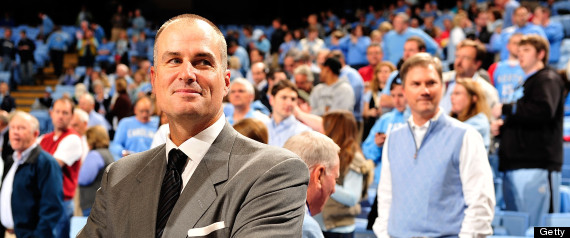ESPN, College Sports Programming Face Uncertain Future
Posted by BHayes on August 29th, 2013Bennet Hayes is an RTC columnist. He can be reached @HoopsTraveler.
If you love college athletics, you have little choice but to love ESPN. The “Worldwide Leader” has long dominated the broadcasting of college athletic events, especially in the two sports that matter most – football and basketball. Earlier in the week, the New York Times released a three-part series of investigative reports that examined the central role ESPN has played in the rise of college sports programming. Many of their discoveries pertaining to the past, present, and future states of the industry fall very much outside the scope of common knowledge, and we came to find out that university athletic officials are actually not all that that different from fans when it comes to ESPN. The network’s value to the world of college athletics is so prodigious, and their monopolizing grasp sufficiently expansive, that whether they like it or not, conference representatives and university athletic departments have been forced to embrace and cater to the network and their needs. Just like us, there is no alternative: They must love ESPN. But in this age of ever-evolving broadcast media possibilities, where cable networks are suddenly finding themselves on perilous footing, the question of the day is whether ESPN will be able to maintain that firm grip on the college sports programming market moving forward.

Jay Bilas Is Just One Of The Many ESPN Personalities We Have Come To Know Well Over The Years; What Is The Network’s Future When It Comes To College Sports Programming? (Getty Images)
Through the 1990s and early 2000s, ESPN built a swath of broadcasting rights to football and basketball games in most of the major conferences. They had no real competition in the space, and were able to get away with accumulating rights for more games than they had time to broadcast. This sort of “warehousing” did not sit well with conference and university athletic officials, who naturally sought maximum television exposure for their conferences and teams. But with no other key players in the marketplace, they had no other option but to stick with the all-powerful ESPN. A 2004 Justice Department investigation into the practice of warehousing prompted the creation of ESPNU as an accommodation to some of those complaints, but while other networks have attempted to beef up their college sports programming volume – Fox, CBS, NBC most notable among them – ESPN still maintains a stranglehold strong enough to force schools to accede to their every demand.
But will this still be the case 10 years from now? Not only are those other networks expected to continue their push to eat up that lucrative college sports pie, but the potential introduction of virtual cable services (by companies like Google, Sony and Intel) threaten to further diminish the value of ESPN within the traditional cable package. All are legitimate threats, but the value of ESPN’s presence as a consistent leader in college sports, across all mediums, should not be overlooked in the conversation. The network will definitely be forced to adjust – and the Times reports that ESPN President John Skipper is acutely aware of this fact – but the ESPN fan base is too loyal to readily accept college sports through another lens. We have spent too many nights at Cameron Indoor ranting and raving with Dick Vitale to be ready to gobble up Fox Sports 1’s college sports menu, too many Saturday mornings laughing with Lee Corso and his headgear selections to abandon cable TV for a Google Internet offering. It’s a notion that may clash with the savage, monopolistic empire that the report describes, but ESPN has established a truly personal connection with its many fans over the years.
The battle for college athletics programming is only just beginning, and the relatively sudden fluidity of the market makes for a story to watch in the coming years. Further complicating the matter is the current practice of bundling in the cable TV market, where ESPN (as well as all the other larger networks) are included in every basic cable package. ESPN’s average monthly price of $5.54 makes it easily the most expensive national network, which has thrust them into example A in the case against bundling. Detractors argue that those who don’t watch the network should not be paying for the regular viewers, and it’s hard to denounce this notion as anything but rational, so don’t expect bundling critics to disappear anytime soon – there will be further discussion of the topic in government circles. It’s just another chaotic element in an already clouded picture, but I am willing to hazard a guess that no matter how and when the dust clears, ESPN’s decades of unparalleled college sports coverage will leave them in good stead in whatever the future programming climate looks like.












































As a coincidence perhaps, the person in the right foreground is Holden Thorp, a remarkably smart and talented man who was forced from his position as Chancellor at UNC over the sports scandal involving the football team. Upon leaving he said that athletics dominated his position rather than the academics that he thought was going to be his main focus.